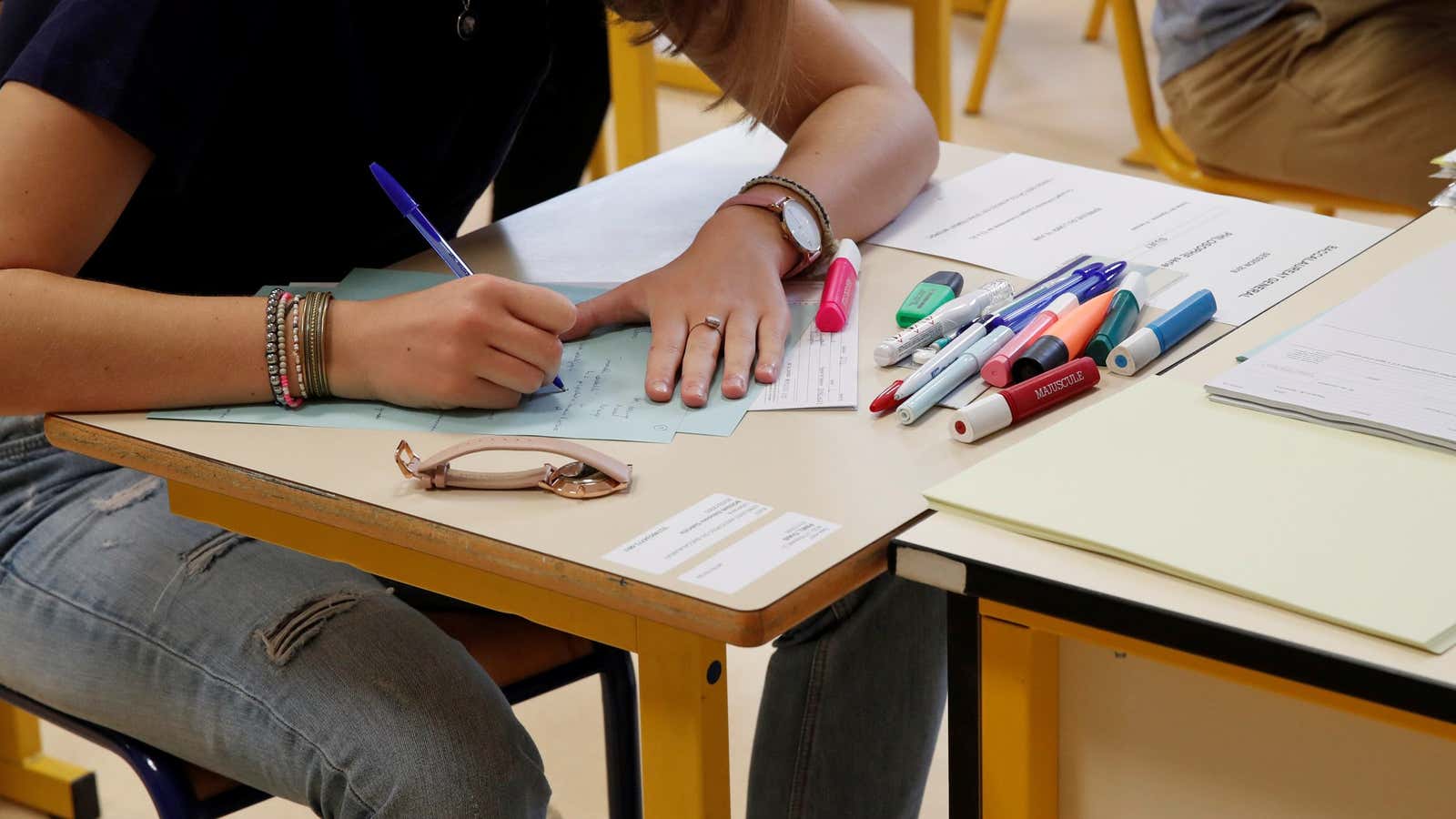Last week, high schoolers across England, Wales, and Northern Ireland received letters notifying them of how they performed in their A-levels, an important exam that often determines their acceptance to a higher education institution. Many more of them were disappointed than usual.
Due to the coronavirus pandemic, the UK government announced in March that schools would close and A-levels would be canceled. At the time, the UK had the sixth-highest Covid-19 caseload (pdf) in Europe.
Instead of the traditional sit-down exam, the Office of Qualifications and Examinations Regulation (Ofqual) asked teachers to submit the grade they thought their students would have likely achieved if they had taken their exams. They were also asked to rank their students within cohorts of those they judged likely to get the same grade, from most to least likely. Ofqal then standardized grades using an algorithm based on students’ past achievements and their schools’ past performance.
Ofqual said the algorithm was needed because teachers tend to be overly generous in their assessments and they wanted to avoid massive grade inflation. As a result, “the focus was on ensuring that there was a similar proportion of high, medium and low grades over time,” explains Anne West, a professor of education policy at the London School of Economics, “not on trying to ensure that the grade accurately reflected the student’s performance.”
About 40% of A-level grades were downgraded from teachers’ assessments, meaning that students received lower grades than the ones expected by universities as a condition of enrollment. Evidence also emerged that, on average, lower-income students’ grades were downgraded more than their richer peers, which can partially be explained by the role that school performance played in the Ofqual algorithm.
Putting a premium on school performance was a poor decision from the start, argues William Smith, a senior lecturer in education at the University of Edinburgh, because it assumes that “generation after generation or year after year we’re going to have the same distribution of marks within that school or community. I don’t know why we’re talking about mobility and opportunity for students if we’re not willing to create space for change.”
“The government’s aim initially was on fairness collectively and on aggregate, at a national level,” said West. It “did not focus on fairness for the individual.”
In the resulting uproar, the government backed down and decided to award students the best grades between those the algorithm gave them and those their teachers had predicted for them. Education secretary Gavin Williamson apologized and now faces calls to resign. Was there a better way to approach this challenge from the start?
A revealing example is France. The country decided in April to cancel the baccalauréat exam, its version of the A-levels. Students received an average of their grades throughout the year, minus any grades obtained during the lockdown that lasted from March 17 to May 11 (link in French). School attendance until July 4, the extended end of the school year, was also taken into account, and local juries of examiners were tasked with increasing grades where necessary.
The benefits of this system, says Smith, are twofold: It values teachers as those “best positioned to understand the growth of students” and creates “a portfolio approach to evaluating students, where teachers are an important voice in that portfolio.”
“The exam is just one input and it’s not a great input; alone, exams do a really poor job of predicting future success,” he added.
The French system still presented challenges. Close to 96% of candidates obtained their baccalauréat, compared to 88% in 2019 (French)(pdf). Teachers’ unions and politicians have complained of grade inflation. Because more students obtained the qualification than usual, officials were forced to open 10,000 new university spots (French) to meet the demand.
It’s a challenge the UK now faces as well. There are normally caps on how many students universities can take in every year, but the government lifted them to encourage schools to take in as many people as possible. Smith is optimistic that hybrid teaching methods tied to Covid-19 and an expected drop in international students should give schools more flexibility; at the University of Edinburgh, he adds, “we would probably welcome a little bit of a surge in our undergraduate students.”
Some see this crisis as an opportunity to rethink the role that A-levels play in the UK education system. Independent of the pandemic, the exam has been criticized as arbitrary, and a reinforcer of class inequalities. “So I think that there’s an opportunity here,” says Smith, “for us to reimagine education.”
